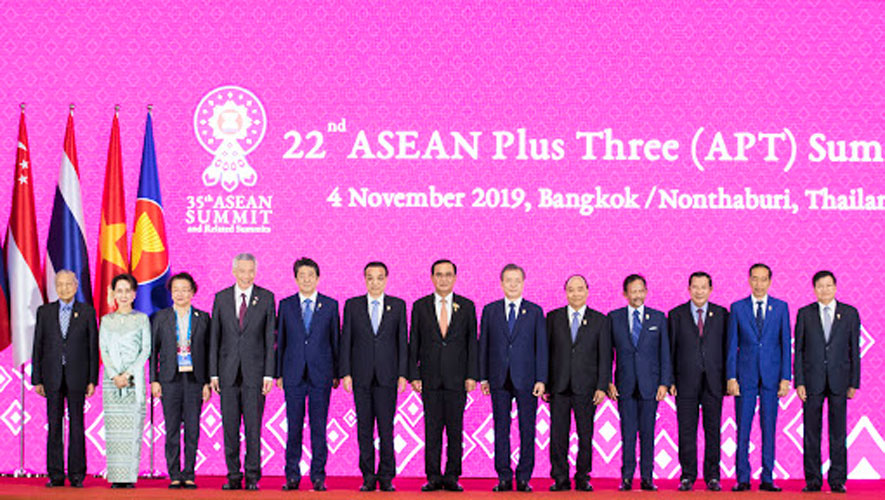The Association of Southeast Asian Nations, (Asean), and its bigger counterpart, Asean+3, comprising the 10 countries and China, Japan and Korea, have been slow to respond to the COVID-19 pandemic. But they have been strenuously ramping up their efforts. However, more needs to be done – and quickly. There are many things they can do immediately, employing their machinery to increase consultation and cooperation to limit contagion – both medical and economic – and beggar-thy-neighbour policies. But in some areas, turning rhetoric into action will necessitate large-scale funding, requiring the Plus Three countries to contribute when they are themselves struggling. Because global efforts have been wanting, a regional response is more important than ever to complement national actions.
For the latest Cambodian Business news, visit Khmer Times Business
COVID-19 is a global health problem best addressed through a coordinated multilateral response. But the G7 could not even release a communique because US President DonaldTrump insisted on using the term “Wuhan virus” instead of Coronavirus. The G20 communique appeared “big on rhetoric, but short on substance”, unlike its response to the global financial crisis of 2007 and 2008. Although the main responses will occur at the national level, regional efforts can complement them and increase their effectiveness.
China and South Korea have been the hardest hit in the region. Both have employed lockdowns with success, and South Korea has demonstrated the value of mass testing in curbing its spread. While there is great variation in infection rates across Asean members, responses vary even more. While all have restricted international movement, domestic activity has been curtailed to varying degrees. Malaysia, the Philippines, Thailand and Vietnam have imposed virtual lockdowns, with Japan creeping up to it, while Singapore has ramped up its social-distancing measures. The measures employed in Cambodia have been relatively lax in comparison.
True to form, Asian’s first response was to convene a Special Asean-China Foreign Ministers’ Meeting in Vientiane on Feb 20, where both sides agreed to strengthen cooperation to fight the disease without specifying any concrete actions.
The Asean senior health officials met virtually on March 13 and arguably the most important takeaway was a need to involve the Plus Three countries, as with previous epidemics. A Special Meeting of the Asean+3 Health Ministers should be convened immediately to draft specific actions, as they did quite successfully when the H1N1 outbreak occurred in 2009. The virtual summit of leaders on April 14 that endorsed the creation of a COVID-19 Response Fund (although no additional funding was committed) and a regional reserve of essential medical supplies further increases the urgency for the health ministers to meet to deal with operational matters.
The role that consultation and cooperation can play should not be downplayed, however, when Malaysia implemented its lockdown in March, the measure had direct and immediate effects on the livelihoods of 300,000 of its residents employed in Singapore. To minimise the disruption, Singapore hastily arranged temporary domicile to accommodate affected Malaysian workers there. This has raised economic and social costs for employers and employees. Had there been more advance consultation prior to the unilateral action, measures could have been pursued to reduce such costs, or to share them more equitably. As an honest broker, Asean is well placed to deal with bilateral issues such as these to maximise collective welfare rather than often narrow, if not misguided national interests.
It is estimated that the majority of the 7 million migrant workers in and from Asean are undocumented. There are significant numbers of such workers from Cambodia, Thailand and elsewhere in the region, just as there are in Cambodia from bordering countries such as Vietnam and elsewhere. As illegal workers, they are denied any kind of social protection. Apart from the risk this poses to their health, it threatens the curtailment measures of host countries. The Asean Parliamentarians for Human Rights have called on Asean to address these issues urgently, but Asean has remained characteristically silent.
The Plus Three have more than their experience and expertise to share, having been at the epicentre. They also have the appropriate financial firepower, if tangible actions are to accompany pronouncements. Asean has very limited resources, not least because its richest members are small and there is limited appetite to surrender sovereignty to a supranational body. If actions require funding, the Asean+3 must be involved.
An Asean+3 finance ministers meeting should be called to coordinate individual stimulus programmes. Coordinated monetary and fiscal responses will increase their impact nationally and reduce free-riding. Divergent national policies, even if they are all in the same direction of monetary easing, can add to financial market volatility. Coordination would limit exchange rate instability, which may result in competitive devaluations and other beggar-thy-neighbour attempts, as well as destabilise inflation expectations.
Should a financial crisis erupt, the Chiang Mai Initiative Multilateralisation (CMIM) – the Asean+3 financial safety net – is available to Cambodia and other members. As a series of promises rather than a fund, it has never been used. But, again, the regional effort could complement rather than substitute for national (and first line of defence, foreign reserves) and global (the lender of last resort, the International Monetary Fund) efforts.
Asean’s success as an economic community has been defined by its ability to use regionalism to promote globalisation. It has done this by pursuing trade and investment liberalisation in a non-discriminatory and outward-looking manner. It is important and timely for Asean to reaffirm its commitment to free and open trade, as the temptation to retreat behind borders or resort to all forms of protectionism (including export bans) starts rising further. The same applies to the Plus Three countries.




